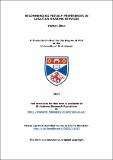Files in this item
Recommending privacy preferences in location-sharing services
Item metadata
| dc.contributor.advisor | Henderson, Tristan | |
| dc.contributor.advisor | Ye, Juan | |
| dc.contributor.author | Zhao, Yuchen | |
| dc.coverage.spatial | vi, 131 p. | en_US |
| dc.date.accessioned | 2017-06-22T09:35:32Z | |
| dc.date.available | 2017-06-22T09:35:32Z | |
| dc.date.issued | 2017-06-21 | |
| dc.identifier.uri | https://hdl.handle.net/10023/11055 | |
| dc.description.abstract | Location-sharing services have become increasingly popular with the proliferation of smartphones and online social networks. People share their locations with each other to record their daily lives or satisfy their social needs. At the same time, inappropriate disclosure of location information poses threats to people's privacy. One of the reasons why people fail to protect their location privacy is the difficulty of using the current mechanisms to manually configure location-privacy settings. Since people's location-privacy preferences are context-aware, manual configuration is cumbersome. People's incapability and unwillingness to do so lead to unexpected location disclosures that violate their location privacy. In this thesis, we investigate the feasibility of using recommender systems to help people protect their location privacy. We examine the performance of location-privacy recommender systems and compare it with the state-of-the-art. We also conduct online user studies to understand people's acceptance of such recommender systems and their concerns. We revise our design of the systems according to the results of the user studies. We find that user-based collaborative filtering can accurately recommend location-privacy preferences and outperform the state-of-the-art when training data are insufficient. From users' perspective, their acceptance of location-privacy recommender systems is affected by the openness and the context of recommendations and their privacy concerns about the systems. It is feasible to use data obfuscation or decentralisation to alleviate people's concerns and meanwhile keep the systems robust against malicious data attacks. | en_US |
| dc.language.iso | en | en_US |
| dc.publisher | University of St Andrews | |
| dc.subject | Location-based services | en_US |
| dc.subject | LBS | en_US |
| dc.subject | Location-sharing services | en_US |
| dc.subject | LSS | en_US |
| dc.subject | Recommender systems | en_US |
| dc.subject | User studies | en_US |
| dc.subject | Privacy preferences | en_US |
| dc.subject | User acceptance | en_US |
| dc.subject | Opportunistic networks | en_US |
| dc.subject | Security | en_US |
| dc.subject | Shilling attack | en_US |
| dc.subject | Reputation systems | en_US |
| dc.subject.lcc | TK5105.65Z5 | |
| dc.title | Recommending privacy preferences in location-sharing services | en_US |
| dc.type | Thesis | en_US |
| dc.type.qualificationlevel | Doctoral | en_US |
| dc.type.qualificationname | PhD Doctor of Philosophy | en_US |
| dc.publisher.institution | The University of St Andrews | en_US |
This item appears in the following Collection(s)
Items in the St Andrews Research Repository are protected by copyright, with all rights reserved, unless otherwise indicated.

